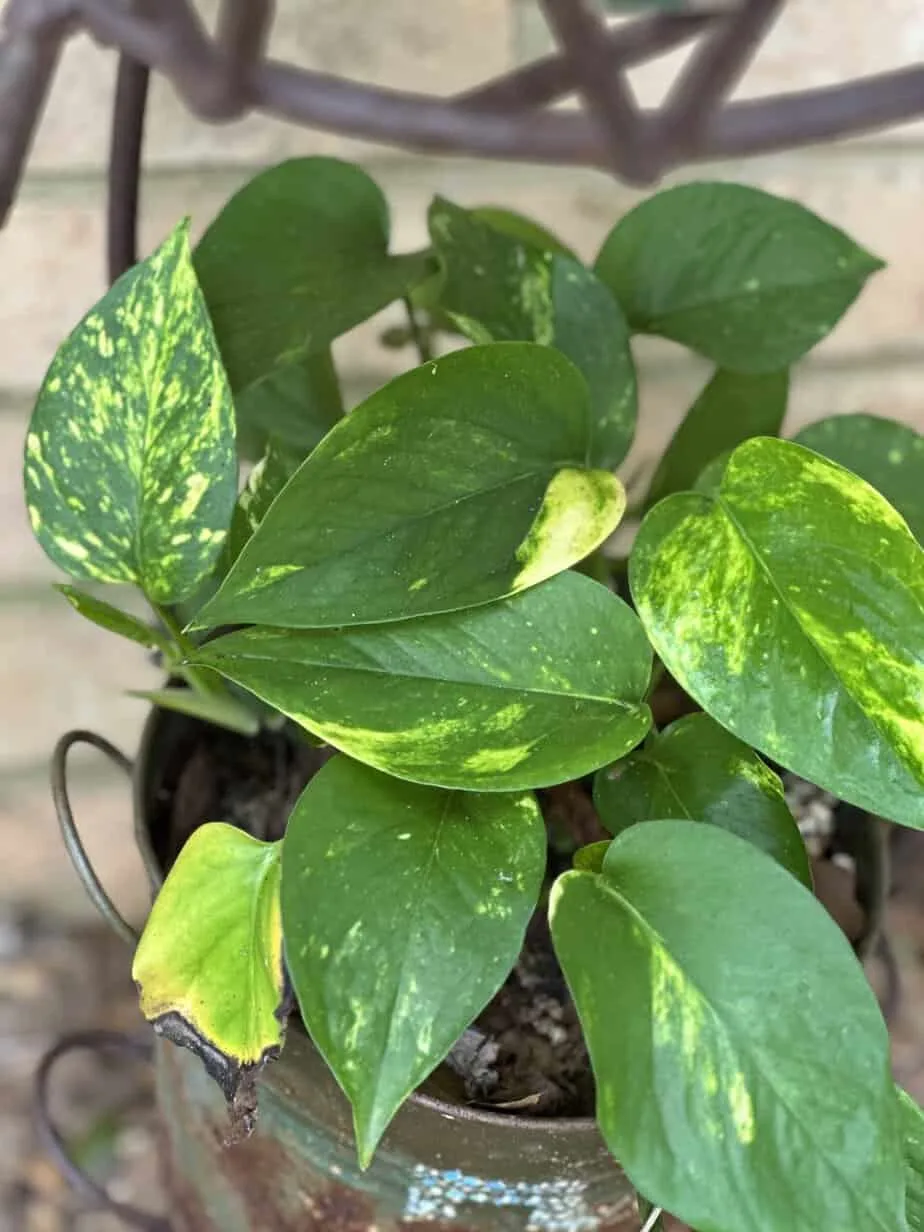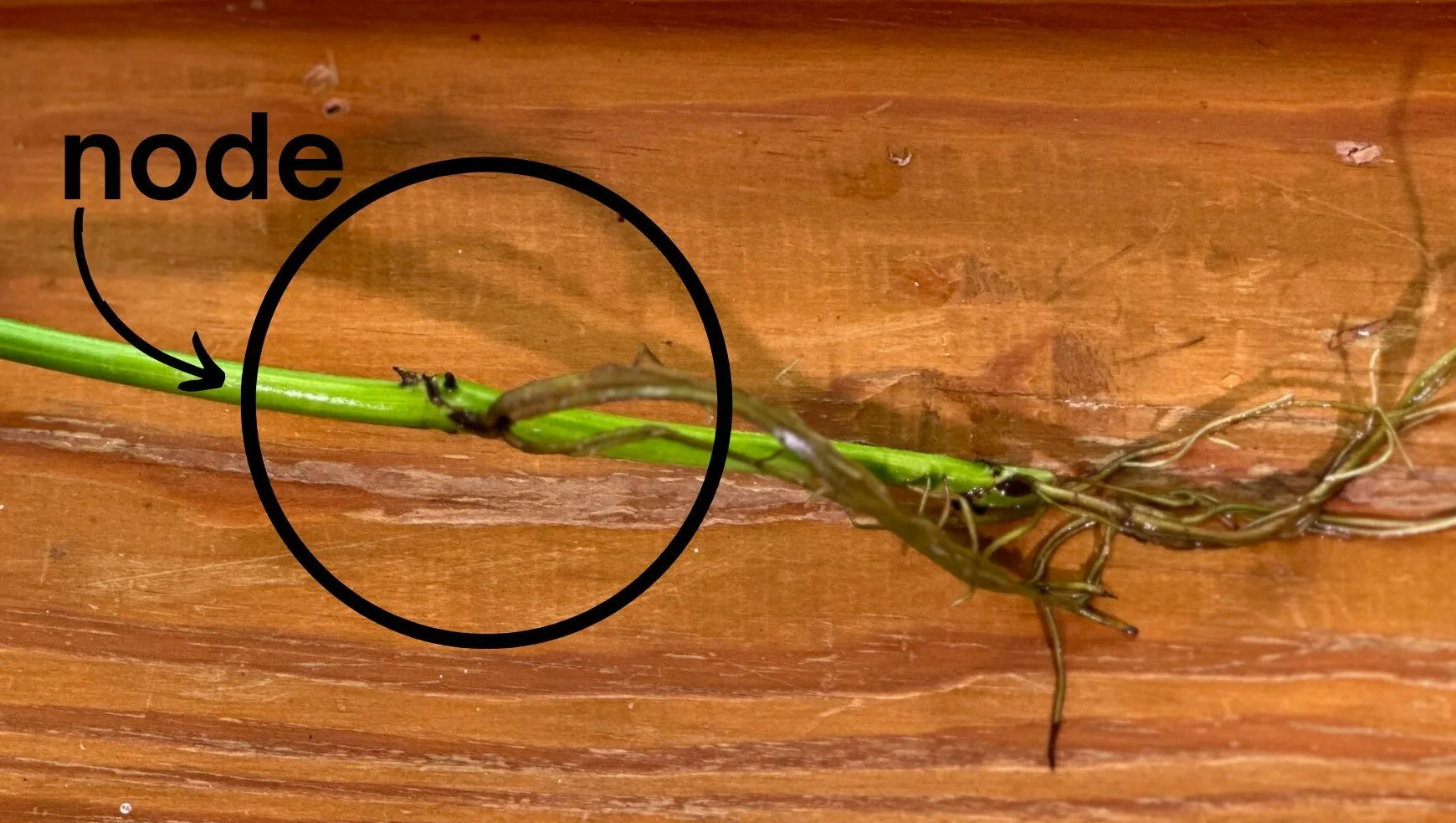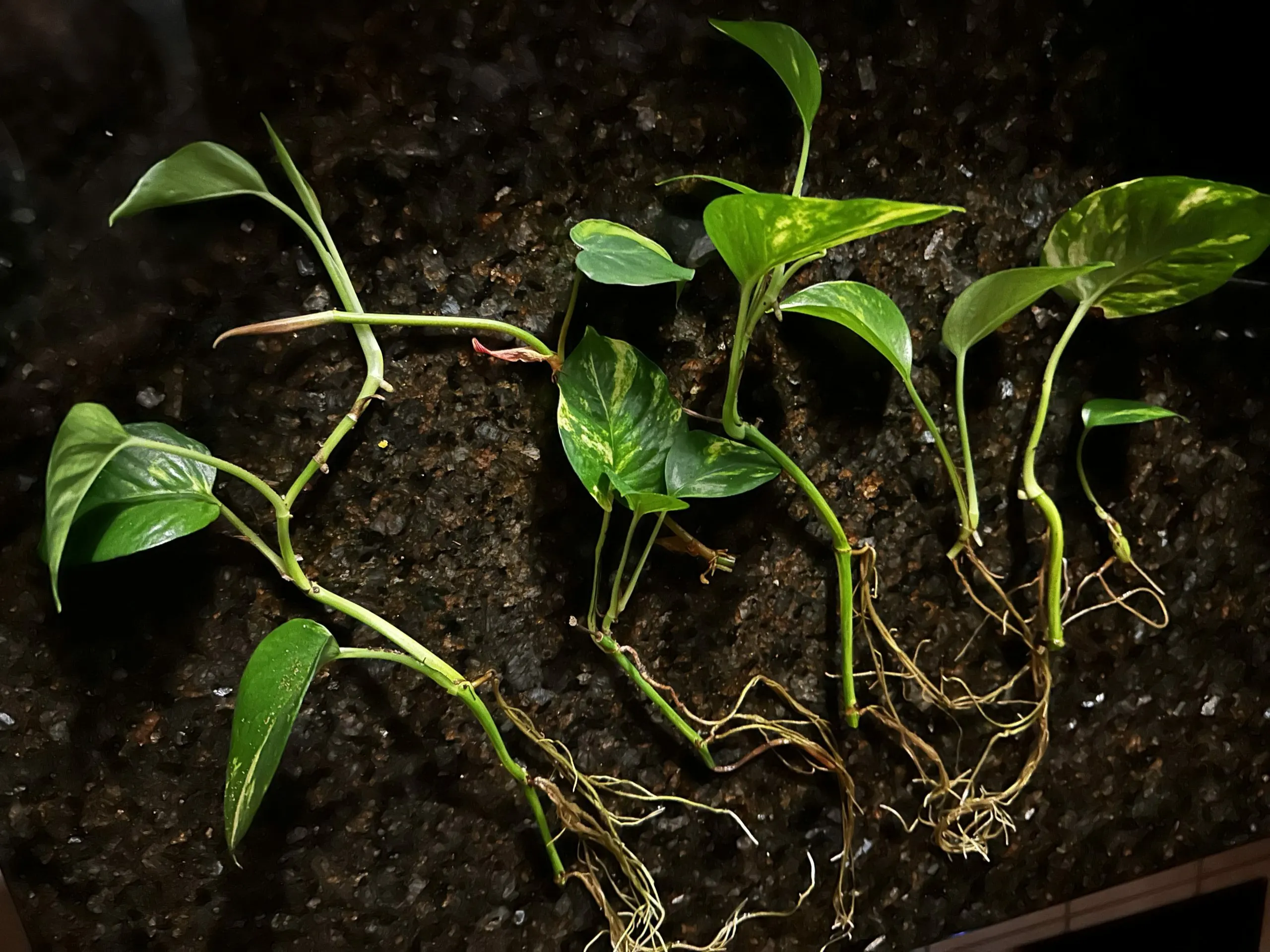The pothos is a popular indoor plant that is well loved because of its low maintenance. Another name for this plant is epipremnum aureum. It is also sometimes called an ivy or devil's ivy. Pothos houseplants are fast growers and easy to take care of, and usually forgiving when you forget to water them. If leaves turn yellow from under watering or overwatering, the dead, yellow leaves are easy to pull off without damaging the plant.

Photo by feey on Unsplash contains affiliate links
The golden pothos is the most common houseplant and the most common variety of pothos plants, but there are many, many more! Other pothos varieties include: neon pothos, N'joy, pearls 'n jade, marble queen, jade, manjula, global green, snow queen, cebu blue and more.
In this step-by-step guide, you will see how easy it is to prune a pothos.
When do you need to prune a pothos?
There is no "best time" for pruning a pothos. It can be done throughout the year as needed, but there are certain times or situations when pruning becomes especially beneficial:
- To Control Size and Shape: Pothos vines can grow quite long and large over time, especially if they have plenty of light and space to grow. Pruning promotes healthy growth and helps keep the plant compact and manageable, preventing it from becoming too unruly or overwhelming its space. Pruning a pothos plant is not necessary, however, if you want to trail the vine along the wall. Simple plant clips can guide the plant and make your space look really cool.
- Encouraging Fuller Growth: Pruning encourages the growth of new stems and leaves, especially if you prune just above a leaf node. This can result in a bushier, more attractive plant.
- After Repotting: If you've recently repotted your pothos, it's a good idea to prune back some of the foliage. This reduces stress on the plant and encourages new growth.
- To Refresh Leggy Growth: If your pothos has long, leggy stems with sparse foliage, pruning can help rejuvenate the plant by stimulating new growth closer to the base.
- Removing Unwanted Long Vines or Tendrils: Sometimes pothos can send out vines that grow in unwanted directions (e.g., climbing up nearby furniture). Pruning these back keeps the plant tidy and prevents damage.
- As Part of Routine Maintenance: Regularly inspect your pothos for any pruning needs as part of your plant care routine. This proactive approach helps maintain the health and appearance of your plant.
- When there is a Bug Infestation or Disease: This takes special care and extra steps, but you will always want to remove affected leaves and parts of the plant that are infested with bugs (such as spider mites or thrips) or have suffered disease.

How do you prune a pothos?
- Gather your tools: You'll need a clean pair of sharp scissors or pruning shears. Clean with alcohol prior to using to avoid spread of disease.
- Identify what to prune:
- Look for long stems that have become leggy or are trailing too far.
- Identify nodes where new growth can potentially emerge.
- Decide on your approach:
- Basic Pruning: Trim back any overgrown stems or leggy growth to control the size and shape of the plant.
- Encouraging Bushier Growth: Prune stems just above a leaf node to encourage the plant to grow more compactly and bushier.
- Make the cuts:
- Use your scissors or shears to make clean cuts just above a leaf node. This is where new growth will emerge.
- For leggy stems, cut back to just above a healthy leaf node to encourage new growth.
- Monitor and care for your plant: After pruning, continue to care for your pothos by providing it with appropriate light, water, and occasional fertilization.
- Don't dispose of the trimmings: Discard bug infested or diseased plants, of course, but if you have pruned because of the length of your pothos, a leggy pothos, or just a regular pruning, save the pruned pieces for propagation and new pothos plants.

How do I propagate a pothos?
Pothos are probably the easiest houseplant to propagate. What does that mean? It means cutting a piece of the mother plant off and make new plants.
What's fascinating about pothos is that it naturally produces its own growth hormones, which are essential for regulating various aspects of plant growth and development. So if you are propagating more than one type of houseplant at a time, put them in the same water as a pothos and you'll have a naturally occurring growth hormone!
Propagating Pothos in Water:
Materials Needed:
- Healthy pothos plant
- Clean, sharp pair of scissors or pruning shears
- Glass or container filled with water
Steps:
- Prepare the Cutting:
- Select a healthy stem from the pothos plant that has at least two or three leaves. Make a clean cut just below a node (the point where a leaf is attached to the stem). Nodes are important because this is where roots will develop. Note: you do not need leaves to propagate a pothos, but you absolutely cannot do it without a node. If you have pruned your pothos and have many little stem cuttings, you can cut them between the nodes and propagate them all.
- Rooting in Water:
- Place the pothos cuttings in a glass or container filled with water, ensuring that the node is submerged.
- Place the container in a location with indirect light and maintain the water level. Add water when the node and new roots are not submerged.
- Root Development:
- After a few weeks, roots will begin to grow from the node submerged in water. You can continue growing the roots in water until they are a few inches long and well-developed. New leaves will grow, too.
- Transplanting to Soil:
- Once the roots are established and several inches long, you can transplant the cutting into a small pot with drainage holes and well-draining potting soil.
- Water the newly potted cutting thoroughly and place it in a location with indirect light.

Propagating Pothos Directly in Soil:
To propagate your plant in soil, simply insert the cutting into the potting soil, ensuring that the node is buried in the soil.
- Water the soil thoroughly after planting to settle it around the cutting.
- Place the pot in a location with indirect light and keep the soil consistently moist but not waterlogged.
- Roots will develop over the coming weeks. You can gently tug on the cutting after a few weeks to check for resistance, indicating that roots have formed.
- Care for the New Plant:
- Once roots are established and new growth appears, continue caring for the new pothos plant as you would for a mature plant. Provide enough light, regular watering, and occasional fertilization during the growing season.
With proper care, pothos houseplants can grow and thrive, making this a popular choice for beginner houseplant owners. Pruning and propagation is a great way to make your pothos fuller and improve the health of the plant, which you can also make baby pothos plants for your collection or gifting to a friend!
